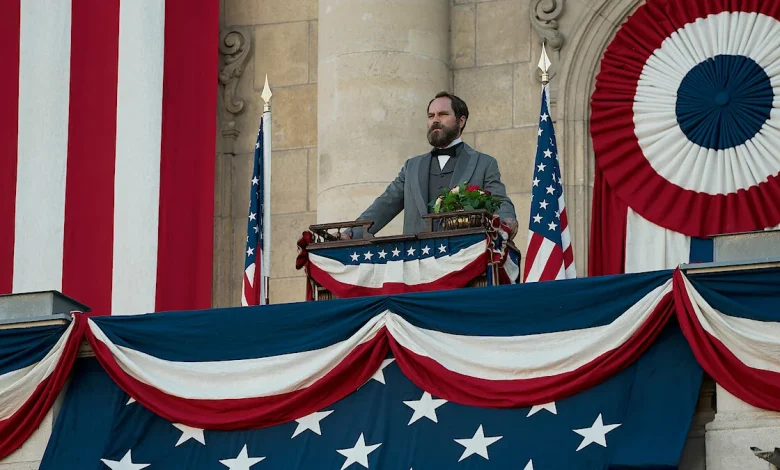The Ending of Death by Lightning : Explore How the True Story Came to Life

This article contains major character or plot details.
James Garfield was only president of the United States for 120 days when he was shot by Charles Guiteau, a disgruntled office seeker. He survived another 80 days before succumbing to his wounds. But, as depicted in the new limited series Death by Lightning, Garfield’s story outlived him.
“He was a man who was so ahead of the times in a lot of ways in terms of his political views,” creator and writer Mike Makowsky tells Tudum. Makowsky was unaware of Garfield’s history before reading Candice Millard’s book Destiny of the Republic, upon which Death by Lightning is based. “I think she made a really, really potent case that this man would have been one of our great presidents.”
In the series, Garfield is played by Michael Shannon, with Matthew Macfadyen taking on the role of assassin Guiteau. “America was a real mess when he became president,” Shannon tells Tudum. “We had not picked up the pieces from the Civil War. There was still a lot of tension and disarray, and it was a monumental challenge to be president at that time.”
Into the midst of that disarray marches Guiteau, a vagabond who finds a way to blame Garfield for his personal problems. “He becomes obsessed with him,” Macfadyen tells Tudum. “All his energy, all his eggs go into the Garfield basket, and that becomes his world. When Garfield’s elected president, Guiteau really believes that he’s responsible, and he’s the key to his success — and then, of course, feels very let down and betrayed.”
Alongside a star-studded cast and against the backdrop of a changing America, these two men will meet — and the country will never be the same. Read on to learn the true story behind Death by Lightning, now streaming on Netflix. As Makowsky puts it, “It’s one of the great what-ifs in American history.”
Is Death by Lightning based on a true story?
Yes, Death by Lightning tells the true story of Garfield’s short-lived presidency, which was chronicled in Millard’s Destiny of the Republic. The series opens with a modern-day vignette: a group of men in a government warehouse discovering a preserved brain, labeled with a name. “Who the fuck is Charles Guiteau?” one asks.
Death by Lightning answers that question in its next scene, which shows an imprisoned Guiteau arguing that he is not a drain on society, but a credit to American culture. “Isn’t that the whole point of this thing? Here, and only here, a man can be anyone,” he insists. “Hell, under the right conditions, he might even be made president.”
Meanwhile, the man who will be president is making a table. James Garfield didn’t aspire to be president — or at least, so he said. For Makowsky and Millard, that’s part of what made him special. “This was a man who deserved the platform that he received largely against his will,” Makowsky says.
Garfield was chosen as a candidate at the Republican National Convention in the days before direct elections by American citizens — in a literal smoke-filled room, party elites would cast their votes in a system that played more like a papal conclave than a modern American election. Garfield, then serving as an Ohio congressman, was never meant to be a candidate for president. But after he gave a fiery speech nominating Treasury Secretary John Sherman (Alistair Petrie), a groundswell of organic support built behind Garfield, ultimately elevating him to the top of the ticket.
The sequence was so crucial to the series that after shooting it, Shannon asked to return and give it a second try. “I went to [director] Matt Ross and I said, ‘Is there any way, since we have extra time, we could revisit that speech?’ ” Shannon says. “Because it was so overwhelming. It’s hard to believe that just came from one human being, that amount of perception, insight, wisdom. It’s astonishing. So I perhaps felt a little unworthy the first time around.”
Garfield beat out a collection of experienced politicians for the presidential nod, including Sherman, former President Ulysses S. Grant (Wayne Brett), and future ally James Blaine (Bradley Whitford). Grant was pushed for an unprecedented third term by the Stalwart faction of the Republican Party, a group led by New York Senator Roscoe Conkling (Shea Whigham), who opposed civil service reform in favor of the favoritism-driven spoils system. Garfield and Blaine belonged to the rival Half-Breed faction, who pushed for reforms based on a merit system.
To unite these two factions, Garfield chose as his running mate Chester Alan Arthur (Nick Offerman), Conkling’s right-hand man and a passionate beneficiary of the spoils system. “He’s very much a crony of the New York political machine at the start of the story,” Makowsky says. “This is not a man who I think ever imagined that he would be president or vice president and ended up, just almost by accident, getting his name on the ticket.”
In this sense, Garfield and Arthur are more alike than they know. The question of Garfield’s true level of ambition is left unresolved in Death by Lightning; reluctant first lady Lucretia “Crete” Garfield (Betty Gilpin) calls into question whether her husband would really give a speech like that if he didn’t secretly dream of the presidency. “To say that he was devoid of ambition probably would be a naive thing to think, but what difference does it make at the end of the day, really?” Shannon asks. “It’s really more about what his intentions were.”
As the campaign heats up, Garfield makes those intentions clear, campaigning on civil rights for free Black men and women. “I think this moment really captures the beautiful and unfortunate mix of genuine aspiration to fulfill a spectacular, unfulfilled promise of this country,” Whitford tells Tudum. “That is a lot of what Garfield is about.”
Garfield is elevated to the White House on a thin margin of less than 10,000 votes and soon finds himself in a nest of vipers. The real threat, however, is lurking outside the convention hall.
Was Charles Guiteau really part of a free love community?
Yes, he was. While Garfield is rising to power, Charles Guiteau is on his own journey. “Candice really honed in on this parallel structure, where she was constantly weighing this great man, James Garfield, against the man who would come to kill him, Guiteau,” Makowsky says. The series follows the same trajectory; it opens with Guiteau’s release from prison and flashes back to him as it tracks Garfield’s ascendance.
Guiteau struggles to fit in with his sister, Franny (Paula Malcomson), dodges out of hotel and restaurant bills left and right, and floats big dreams of starting a newspaper that will change America. “He’s always after something, he’s always reaching for something, and he’s always in action,” Macfadyen says. “He’s desperate for attention or a job or for someone to read his speech that he’s written.”
Guiteau’s desperation comes in part from a lifetime of rejection. In one memorable flashback, we catch a glimpse of his time in the Oneida Community, a communal society founded by John Humphrey Noyes in upstate New York. The Oneida population practiced free love and sexual freedom — but Guiteau was a sticky wheel in their perfectionist world. “He was the one man who couldn’t get laid at the free love commune,” Makowsky says. “He refused to do the manual labor required of him, so the women up in Oneida would call him Charles Gitout. That’s all true.”
Did Charles Guiteau really meet James Garfield?
Yes. Guiteau eventually finds his way to Chicago, where he pivots to politics, becoming a committed Stalwart — until Garfield wins the nomination. Then the flighty vagabond promptly reverses course. Guiteau is convinced he deserves a consular position in Garfield’s impending administration, and he’ll work to get him elected to earn that spot. How does he do so? By delivering one campaign speech, originally written for Grant, and battering down the doors of Garfield’s various advisors.
Guiteau even sneaks into a lavish gala and meets with the first lady herself. “They get chatting, and she doesn’t suspect that he’s untoward or weird in any way,” Macfadyen says. “They have a good connection, and then at the end of the scene, there’s a lightning bit to see if I can meet her husband, and she recoils.”
In the late 1800s, the White House remained open to the public, and office seekers would crowd the lobby waiting for their chance to meet with the president. “This is one of the things that makes Garfield so miserable, because he was forced personally to meet with office seekers every day between 9 and 1,” Millard says. “If you wanted to have a role in the post office, you would go ask the President of the United States.”
Guiteau’s pyrrhic quest for recognition was inspired by a surprising touchpoint: Martin Scorsese’s 1982 cult classic The King of Comedy. “I told [Candice] that when I read the book, it reminded me so much of Rupert Pupkin in The King of Comedy,” Makowsky says, referring to Robert De Niro’s aspiring comedian, who’s so desperate for an act on The Jerry Langford Show that he kidnaps its host (Jerry Lewis).
In Death by Lightning, Garfield’s personal secretary, Joe Brown (Archie Fisher), is in charge of wrangling White House. applicants. He soon grows used to seeing Guiteau in the waiting room — just as secretaries in The King of Comedy grow used to seeing Pupkin waiting for his audience with Jerry Langford. “Charles Guiteau in every conceivable way is the historical antecedent of Rupert Pupkin,” Makowsky says. “That was my biggest reference point for that character.”
Eventually, Guiteau gets the opportunity to briefly meet Garfield. It’s a scene based on a real meeting, where Guiteau gave Garfield a copy of the campaign speech he delivered, received a handshake in return, and left. In the series, their conversation lasts a little longer.
Guiteau expresses his admiration for Garfield, who has risen from poverty to the highest office in the land in the same manner Guiteau has always dreamed he might someday. “Tell me how I can be great, too,” he implores Garfield, who responds with befuddlement and is called away to care for Crete, who has fallen ill with malaria.
Later, Guiteau is essentially banned from the White House. He then meets Secretary of State James Blaine and tries once more to receive a consulship to Paris, this time presenting a forged letter from Garfield recommending him. Blaine, out of patience, lashes out. “You have no prospect at a job in this administration whatsoever,” he tells him. A furious Guiteau resolves to assassinate Garfield — to fix the country he now views as being led by a corrupt betrayer.
How was James Garfield assassinated?
Even 16 years after the assassination of Abraham Lincoln, American presidents lacked security — which allowed Guiteau to fire two bullets at the president in Washington’s Baltimore and Potomac Railroad Station. “The great irony was his wife wanted him to pay for private security, and he would wave that concern off,” Makowsky says. “It’s in the show: ‘Assassination can be no more guarded against than death by lightning. And it’s best not to worry too much about either one.’ ”
As Millard tells it, the American government at the time believed that assassinations were a natural consequence of monarchy, which meant a freely elected president would not be in danger. “It took until after McKinley’s assassination that we finally realized that we need to protect our presidents,” Millard says. The Secret Service was tasked with the responsibility in 1902, two decades too late to protect Garfield.
Guiteau is arrested, and Garfield is taken away to be cared for by a team of the country’s most preeminent doctors, including Dr. Bliss (Željko Ivanek) and Dr. Purvis (Shaun Parkes), the first Black doctor to attend to an American president.
As Millard’s book tells it, Garfield’s deathbed soon becomes a battleground. Joseph Lister’s argument for antiseptic treatment was still viewed with widespread skepticism in the American medical field, and Bliss had no regard for such procedures.
Modern medical consensus suggests that Garfield could have survived the initial assassination attempt and that it was the constant probing of the wound by his doctors that caused infection and killed him. “The bullet went in his back; it didn’t hit any vital organs, it didn’t hit his spinal cord,” Millard says. “This is right after the Civil War — there are a lot of men walking around with bullets in them. In fact, the guy who first captured Guiteau after he shot Garfield had a bullet in his brain and had been living like that for years.”
In 1881, warnings fell on deaf ears. “In that train station, there was another doctor, Charles Purvis, who had read up on the latest medical science coming out of Europe and very much cautioned Bliss against not sterilizing his probe,” Makowsky says. “And Bliss waved him away. Bliss said he didn’t believe in invisible monsters, these germs, and dismissed the younger doctor. At the end of the day, Guiteau may have fired the bullet, but he’s not Garfield’s ultimate murderer.”
Not even the assistance of telephone inventor Alexander Graham Bell (Richard Rankin) could protect Garfield from his doctors. Bell contributes a makeshift metal detector that suggested the bullet was on the other side of Garfield’s body — but Bliss refuses to accept that his initial instinct was incorrect. Garfield is left to die a slow and undignified death: an American tragedy.
What happened to Chester Alan Arthur?
Even before his assassination, Garfield was wrestling with political opponents who sought to smother the ambitions of his fledgling administration. The spoils system still reigned supreme, and the president’s efforts to replace corrupt appointees with merit-based appointments ran into an obstacle in the form of Senator Conkling. Along with Vice President Arthur, Conkling conspired to block Garfield’s appointments — and finally, resigned in protest rather than vote in favor. Conkling assumed he would be promptly reinstated by the New York legislature, but instead they replaced him, effectively ending his political career.
Arthur is left behind, a vice president from another time. “More than any other character in Candice’s book, the one that I was just the most stunned ever existed was Chester Arthur,” Makowsky says. “Over the course of meeting and knowing James Garfield and being on the sidelines for this awful period in American history, he really regains his soul and discovers what matters to him.”
Even in the face of Arthur’s constant insubordination and collaboration with Conkling, Garfield stood strong. As he tells Blaine at one point, after rejecting Arthur’s attempt to resign, “I feel there’s some good in him, deep down.”
“I think it’s salient that he started out as a sort of reform lawyer himself,” Offerman tells Tudum. “Until he gave up on his morals, and sided up with Roscoe Conkling.”
When Garfield is assassinated, Arthur is elevated to a position he never dared to dream of — and the influence of his former boss sticks around. “Over the course of the series, we get to see Garfield really exercise an influence on him that disarms and surprises Chester Arthur — and ends up kind of convincing him of his better angels and reminding him of the man he was before he became a crony for the spoils system,” Makowsky says.
Millard’s book lays out another fascinating part of Arthur’s life — his correspondence with Julia Sand, a New York City woman who sent the President letters encouraging him to grow into the presidency. While this detail didn’t make it into the series, it informed Offerman’s performance as Arthur. “I feel like the woman that reached him with her letters sort of represented his conscience, the voice of his morality that he had lost touch with,” Offerman says. “In our story, I let Garfield and Lucretia represent that voice. I love the arc that I got to play out.”
As the final titles of the series lay out, Arthur went on to pass civil service reforms that endure to this day, before leaving after a single term. Quite the legacy for a man Blaine takes pleasure in calling “the worst vice president in history.”
How does Death by Lightning end?
Death by Lightning closes in almost the same way it opens: with Guiteau’s brain being preserved for science and with Lucretia Garfield sitting down at the table James once built with his own two hands. Their daughter, Mollie (Laura Marcus), has married Garfield’s secretary, Joe Brown, and Crete is surrounded by family as she looks at her husband’s empty chair.
Makowsky sees Lucretia as the quiet hero of Death by Lightning, her legacy another victim of Garfield’s untimely death. “I don’t think that she was content just sort of falling into the traditional mores expected of a first lady in 1881,” he says. “Had she had the ability to affect the level of change that her office entailed, I think she would’ve been seen as a really positive role model. And unfortunately, almost no one ever really got to hear about how remarkable she was because of what happened to her husband.”
Before these final images, Lucretia and Guiteau meet one last time, in a scene invented by Makowsky. Crete delivers the imprisoned assassin a message that cuts to the bone of Guiteau’s deluded existence. “She comes to see him in prison and tells him that his memory and his legacy will amount to nothing, which is the worst news that he can get,” Macfadyen says. “That’s the worst thing, that he won’t mean anything.”
Guiteau delivers a final address at his execution, a strange poem he wrote that concludes with a dead-eyed stare from the audience. “Oh,” he whispers, before it’s over.
While Guiteau’s legacy may be nothing, Millard hopes that Death by Lightning will offer an opportunity for viewers to reconsider Garfield’s. “I hoped, in my small way, through a book, that I could bring him back to life,” she says. “But I feel like Mike, through this series, will bring so many more to Garfield’s story and the understanding of what we lost at that time. And maybe the understanding of what we could have again.”
Makowsky concurs. “He’s been relegated to this obscure footnote,” he says. “I wanted to be able to introduce people to a man I think we all wish that we could have known.”
You can meet James Garfield — and Charles Guiteau — in Death by Lightning, now streaming on Netflix.





